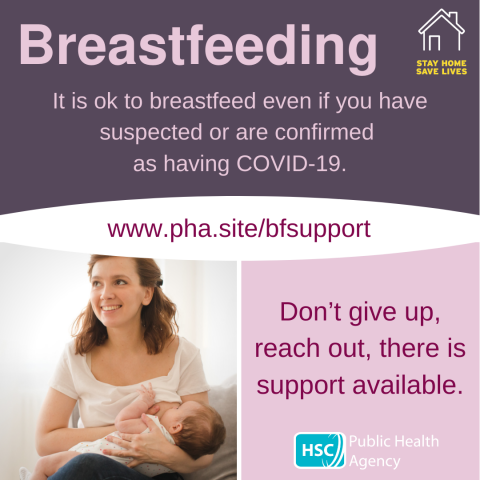You are not alone - breastfeeding support is still available during COVID-19

COVID-19 is affecting all our lives and there is a lot we need to get used to. If you are pregnant or you have just given birth, this can be a particularly worrying time. But as we are all spending much more time in our homes, this can present a great opportunity to start and continue to breastfeed.
Janet Calvert, Health and Social Wellbeing Improvement Manager at the PHA, said: “We know that breastfeeding mums need support and with the reduction of home visits from health professionals we want to make sure you know you are not on your own.
“Breastmilk provides all the nutrients your baby needs to grow and develop; it has very special ingredients such as antibodies, hormones and stem cells to help protect your baby now and in the future. Breastmilk helps to protect your baby from stomach infections, ear and chest infections, kidney infections as well as sudden infant death syndrome (SIDS). It is also important as it helps mum and baby build a strong bond and the hormones produced while breastfeeding can really help relax both mum and baby during this anxious time.
“It is important to know that even if you have suspected or confirmed COVID-19 that breastfeeding is still recommended by the World Health Organization (WHO), and the well-recognised benefits of breastfeeding outweigh any potential risks of transmission of coronavirus through breastmilk.
“Other great benefits of breastfeeding which are particularly important during this pandemic are the fact that breastmilk is free and easily accessible.
“You can continue to keep up a good milk supply for your baby through enjoying lots of skin-to-skin contact, breastfeeding frequently and responsively, including through the night, and monitoring your baby’s wet and dirty nappies to know that things are going well.”
It is also possible to return to breastfeeding if you have recently (within the past few months) stopped and breastfeeding was well established. Speak to your health care professional if this is something that you would like to re-establish. The longer you breastfeed the better – the WHO recommends that babies are exclusively breastfed until around six months, and then after solid foods are introduced that breastfeeding continues into the second year of life and beyond.
Janet concluded: “Although we need to stay at home, there is still breastfeeding support available, both over the phone and online. To find out more about support visit the website www.breastfedbabies.org.
“The most important thing to remember is that you are not alone, reach out the support is there and you can use this extra time you have at home with your baby as an opportunity to be able to carry on breastfeeding.”
For further information on maternity services during COVID-19 see: www.ni-maternity.com
- Your Health and Social Care Trust will have provided you with telephone numbers for community midwives and health visitors. You may also have a breastfeeding peer support volunteer who is available over the phone or via text.
- On discharge from hospital you will have got the purple book ‘Off to a Good Start’ www.publichealth.hscni.net/publications/good-start . This is a great resource to know when things are going well and to find out how to get a really good latch. There are also some great videos and pictures in the ‘attachment and positioning’ section of www.breastfedbabies.org .
- If you still have concerns the National Breastfeeding Helpline is available 7 days a week from 9:30am to 9:30pm - 0300 100 0212. They also offer a web chat www.breastfeedingnetwork.org.uk/chat/ breastfeeding support service for mums and their supporters in the UK. It is a confidential one-to-one secure online chat with a trained breastfeeding supporter. It works like instant messaging– it’s just typing, there are no webcams, and the only people who can see the chat are the user and the volunteer supporter.
